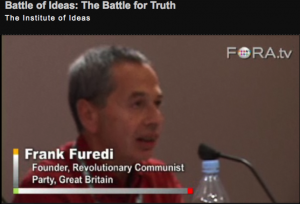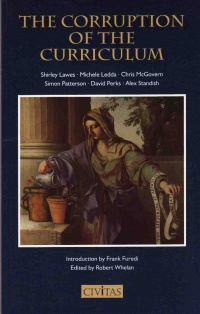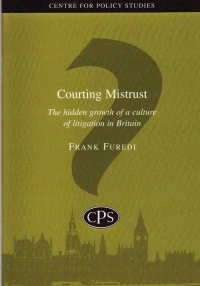Frank Füredi
LM network resources
|
Frank Furedi (originally called Ferenc Füredi, Dob 3 May 1947) is professor of sociology at the University of Kent at Canterbury, UK and a leading associate, perhaps the leading associate, of the LM network. He was, under the pseudonym Frank Richards, a leading member of the Revolutionary Communist Group, then, having been expelled from the RCG, the founder and chairman of the Revolutionary Communist Tendency, later the Revolutionary Communist Party (RCP). The RCP has traversed one of the longest ideological journeys in British politics, moving from the what it described as 'ultra-left', through several incarnations into a broad collection of organisations on the libertarian right wing, including Spiked Online and the Institute of Ideas. Furedi continues to be a leading figure in this network of organisations, characterised by a vigorous anti-environmentalist, pro-GM stance, known as the LM network.

Aside from his academic work, he is frequently quoted in the media as an expert on how our society has become obsessed with risk. He writes regularly for Spiked Online, and has written several books on the subject, with titles such as Paranoid Parenting, Therapy Culture, and Culture of Fear. He wrote an article about risk culture post September 11, one of only two papers published by Global Futures. Furedi also writes a column for the Times Higher Education supplement.[1]
Furedi has also written under the 'Party' names of Frank Richards and Linda Ryan.[2] He was born in Hungary in 1947. His family emigrated to Canada after the Soviets crushed the 1956 uprising. He has lived in Britain since the 1970s but remains a Canadian citizen. [3] He is married to Ann Furedi.
Contents
Early life
In Quebec and the student movement in the 1960s
In 2008 Furedi gave the following account of his short career as a student radical:
- In October 1967, I returned to McGill University in Montreal for my third year of a political science undergraduate course. Compared with most student activists, I was not particularly radical. However, I had resolved to no longer put up with the tedious political lectures on offer in my course. At this time, political science seemed to have taken refuge in the lifeless, uninspiring models of ‘participation’ and ‘behaviour’. After two years of dull institutional analysis, I was ready for something a bit stronger, a bit more meaningful.
- Without really knowing why, I found myself at the launch meeting of a student Political Science Association. Everyone was talking about the need for a major reorientation of our study programme. Students were demanding a more intellectually stimulating course of political science – one that was more radical and more engaged. Again, I don’t how or why I got up to speak in public for the first time in my life – but by the end of the meeting I found myself elected to the executive of the newly formed PSA. My short career as a student radical was about to begin.
- Campus radicalisation appeared to develop effortlessly. Without very much exertion we organised a series of meetings, and in November 1967 we got the majority of political science students to vote for an occupation of the floor of the building where our teachers’ offices were based. The occupation successfully forced some concessions from the university, and left us all with the impression that taking this kind of direct action was the way forward. More importantly, everyone involved in the occupation experienced a real sense of elation, which further reinforced our conviction that ‘anything and everything is possible’. In the succeeding months, I was involved in a series of strikes and demonstrations, which won the support of large numbers of students and gained some quite considerable media coverage and publicity.
- Yet, looking back, I am struck by the shallowness of Sixties radicalism. Our ideas were relatively incoherent and unformed. Most of my peers read Herbert Marcuse and Fanon, and on occasion the young Marx. Many student radicals adopted an eclectic mix of future-oriented radical ideals alongside some backward-looking, anti-modern and anti-technology romantic sentiments. And our talk of social emancipation quickly turned into an obsession with individual liberation – which was often another way of trying to transcend personal problems. But at least, unlike many people today, we were captivated by ideas that outwardly soared above everyday mundane reality.
- In retrospect, it is tempting to dismiss the student radicals of the 1960s as immature, even narcissistic. However, to do so would be one-sided, and it would overlook the energy, idealism and seriousness with which many young people engaged with the world around them. What strikes me now, however, is the ease with which radicalism was able to proceed back in the late 1960s. The occupations and demonstrations we organised were part of what we labelled our ‘struggle’ – yet I can now see that very often it felt like we were kicking through an open door.
- The university authorities, and other elders whom we confronted, tended to be deeply defensive and uncertain about their own authority. They certainly were not up for a struggle, and invariably they opted for delaying tactics and compromise with the radical student groups. At the time, I didn’t understand that the reason why it appeared to us that ‘anything is possible’ was because people in positions of power were estranged from their own authority. In any case, I was soon reminded that it was easier to talk about than to realise change. In August 1968, the so-called Prague Spring was brought to an end through the exercise of Soviet military power. The popular movement for democracy, which showed so much potential, was swiftly repressed. Anything was not possible, it seemed, in Eastern Europe – or in the West, either, as I would soon discover.
- After Prague, I ceased to think of myself as a student radical. As a child, I lived through the Hungarian Revolution of 1956, which means I experienced the crushing of the Prague experiment as an intensely familiar tragedy. All of a sudden, Sixties radicalism appeared empty of ideas, and I started to find its rhetoric extremely irritating. With the ascendancy of lifestyle politics, it was difficult to avoid noting the powerful anti-intellectual currents that sprung from the soul of Sixties radicalism. I wasn’t interested in ‘changing my head’ – I wanted to change the world around me. So at the end of the Sixties, I began to sense that rather than talk the talk, I had to sort out my ideas.
- …However, it is far from evident who bears responsibility for the events of the Sixties – the students marching on the streets of Paris, London and Berlin, or sections of the ruling elites who lost belief in the cultural legacy that underpinned their authority? Sadly, the decline of traditional authority has not been matched by the emergence of an enlightened, future-oriented alternative. Today, figures of authority rarely speak the language of human values. Instead they hide behind a cynical, technocratic worldview, and subject public life to the narrow instrumentalist logic of performance, delivery and best practice. Many of yesterday’s student radicals have been integrated by this new Establishment. They have opted for a small-minded, politically correct worldview that readily complements the political class’s ceaseless desire to ‘modernise’ and ‘reform’ its institutions.
Furedi's exit from IS and the RCG
In 1975 Furedi (using the name Frank Richards) was listed as a member of the editorial board of the RCG theoretical journal Revolutionary Communist at the time of issue number two dated May 1975.


Education, Career, Affiliations, Company Directorships, Resources, Contact, Notes
Education
- 1965-69 McGill University, BA Political Science
- 1969-70 School of Oriental and African Studies, MA African Politics
- 1970-74 School of Oriental and African Studies. Ph.D Research PhD Title: The Mau Mau Revolt in Perspective[5]
Affiliations
- Manifesto Club | Living Marxism | LM group | Revolutionary Communist Tendency | Revolutionary Communist Party | Civitas has written for them including after receipt of funding from the Nigel Lord Vinson Charitable Trust | Centre for Policy Studies - has written for them | Lanesborough Lunch The inaugural event (20/5/99) of this tobacco industry funded series was addressed by Frank Furedi.[6]
Company directorships
- Spiked - Director from 5 September 2000 and Shareholder | Twymans Mill Management Company Limited Appointed 19 May 2003, company dissolved 31 August 2004 | Open Dialogue, Appointed 19 February 1998, Resigned 7 February 2003 | Inter-Generation Appointed 22 April 2008[7] |
Publications By Furedi
See main articles:
Resources
Contact Details
- Website: www.frankfuredi.com
Biographical Notes
- University of Kent staff profile for Frank Furedi
- Profile "Frank Furedi", Centre for Parenting Studies website, accessed 29 Dec 2010
Interview With Furedi
- Michael Duffy interviews Frank Furedi, "Paranoid Parenting", Counterpoint, Australian Broadcasting Corporation, February 21, 2005.
General Articles
- George Monbiot, "Far Left or Far Right?", Prospect Magazine, November 1998.
- Living Marxism profile, GM Watch, accessed Dec 2003.
- David Pallister, John Vidal and Kevin Maguire, "Life after Living Marxism: Banning the bans", The Guardian, July 8, 2000.
- George Monbiot, "Invasion of the Entryists", The Guardian, December 9, 2003.
- ReadySteadyBook.com, Frank Furedi interview, accessed 25 October 2004
- Maureen Freely and Martin Bright, Review of "Paranoid Parenting", The Observer, 11 March 2001.
- Andy Rowell, "LobbyWatch: SMC complaint", April 2007. (This is an edited version of a submission made by Andy Rowell to the board of the Science Media Centre).
- "Interview with Monbiot on the LM group", Lobbywatch, April 11, 2007. (This interview was undertaken some time earlier than the publication date).
- Brendan O'Neill, "'Humanising politics – that is my only agenda'", Spiked Online, April 25, 2007.
Notes
- ↑ Frank Furedi, Nine out of ten dogmas, Times Higher Education Supplement, 20-November-2008
- ↑ Juliette Hughes The truth is downright dirty The Age (Australia), June 2, 2007
- ↑ Data from Companies House, accessed 19 April 2011
- ↑ Frank Furedi http://www.spiked-online.com/index.php?/site/reviewofbooks_article/5020/ My 1968: The rise of radicalism and the fall of authority]. Spiked Review of Books, Issue 12, April 2008
- ↑ University of Kent Frank Furedi, CV, March 2008, accessed 18 January 2011
- ↑ Frank Furedi 'Litigious Britain: Consolation and the compensation culture' The Risk of Freedom Briefing, Issue No. 1 October 1999, p. 3.
- ↑ Data from Companies House, accessed 22 November 2010
